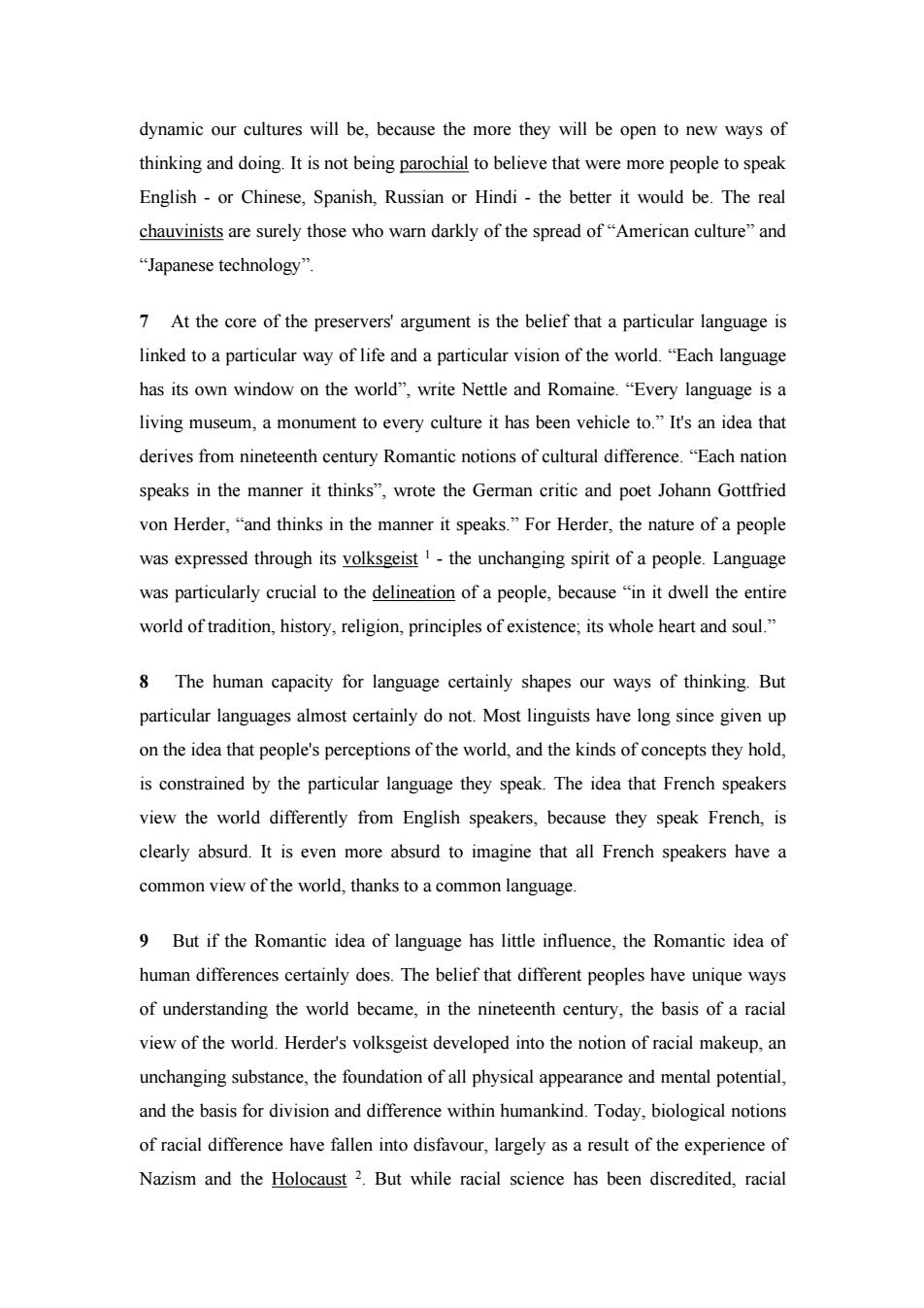正在加载图片...

dynamic our cultures will be,because the more they will be open to new ways of thinking and doing.It is not being parochial to believe that were more people to speak English-or Chinese,Spanish,Russian or Hindi-the better it would be.The real chauvinists are surely those who warn darkly of the spread of"American culture"and "Japanese technology". 7 At the core of the preservers'argument is the belief that a particular language is linked to a particular way of life and a particular vision of the world."Each language has its own window on the world",write Nettle and Romaine."Every language is a living museum,a monument to every culture it has been vehicle to."It's an idea that derives from nineteenth century Romantic notions of cultural difference."Each nation speaks in the manner it thinks",wrote the German critic and poet Johann Gottfried von Herder,"and thinks in the manner it speaks."For Herder,the nature of a people was expressed through its yolksgeist I-the unchanging spirit of a people.Language was particularly crucial to the delineation of a people,because "in it dwell the entire world of tradition,history,religion,principles of existence;its whole heart and soul." 8 The human capacity for language certainly shapes our ways of thinking.But particular languages almost certainly do not.Most linguists have long since given up on the idea that people's perceptions of the world,and the kinds of concepts they hold, is constrained by the particular language they speak.The idea that French speakers view the world differently from English speakers,because they speak French,is clearly absurd.It is even more absurd to imagine that all French speakers have a common view of the world,thanks to a common language. 9 But if the Romantic idea of language has little influence,the Romantic idea of human differences certainly does.The belief that different peoples have unique ways of understanding the world became,in the nineteenth century,the basis of a racial view of the world.Herder's volksgeist developed into the notion of racial makeup,an unchanging substance,the foundation of all physical appearance and mental potential, and the basis for division and difference within humankind.Today,biological notions of racial difference have fallen into disfavour,largely as a result of the experience of Nazism and the Holocaust 2.But while racial science has been discredited,racialdynamic our cultures will be, because the more they will be open to new ways of thinking and doing. It is not being parochial to believe that were more people to speak English - or Chinese, Spanish, Russian or Hindi - the better it would be. The real chauvinists are surely those who warn darkly of the spread of “American culture” and “Japanese technology”. 7 At the core of the preservers' argument is the belief that a particular language is linked to a particular way of life and a particular vision of the world. “Each language has its own window on the world”, write Nettle and Romaine. “Every language is a living museum, a monument to every culture it has been vehicle to.” It's an idea that derives from nineteenth century Romantic notions of cultural difference. “Each nation speaks in the manner it thinks”, wrote the German critic and poet Johann Gottfried von Herder, “and thinks in the manner it speaks.” For Herder, the nature of a people was expressed through its volksgeist 1 - the unchanging spirit of a people. Language was particularly crucial to the delineation of a people, because “in it dwell the entire world of tradition, history, religion, principles of existence; its whole heart and soul.” 8 The human capacity for language certainly shapes our ways of thinking. But particular languages almost certainly do not. Most linguists have long since given up on the idea that people's perceptions of the world, and the kinds of concepts they hold, is constrained by the particular language they speak. The idea that French speakers view the world differently from English speakers, because they speak French, is clearly absurd. It is even more absurd to imagine that all French speakers have a common view of the world, thanks to a common language. 9 But if the Romantic idea of language has little influence, the Romantic idea of human differences certainly does. The belief that different peoples have unique ways of understanding the world became, in the nineteenth century, the basis of a racial view of the world. Herder's volksgeist developed into the notion of racial makeup, an unchanging substance, the foundation of all physical appearance and mental potential, and the basis for division and difference within humankind. Today, biological notions of racial difference have fallen into disfavour, largely as a result of the experience of Nazism and the Holocaust 2 . But while racial science has been discredited, racial